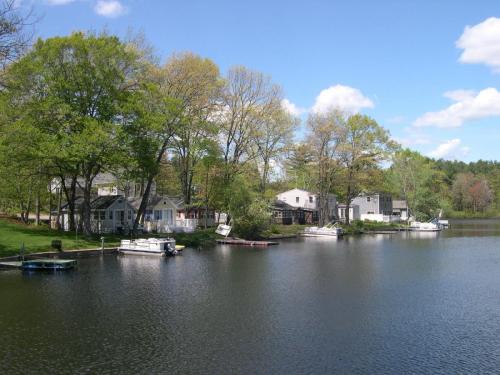Stormwater Pollution Prevention for Residents

What is stormwater runoff?
Stormwater is the water that runs off of the land surface when it rains or snow melts. It enters the Town's storm drain system and flows directly to local lakes, streams and wetlands. Stormwater runoff from undeveloped land is typically low since most rain or snowmelt infiltrates into the ground or is lost to evaporation. Additional runoff from developed areas is created from impervious surfaces like streets, parking lots, and rooftops that prevent stormwater from naturally soaking into the ground.
Why is stormwater runoff a problem?
Stormwater from developed areas typically contains a number of pollutants, such as oil and grease from roadways and parking lots, pesticides and fertilizers from lawns, sediment from construction sites, sand and dirt from roadway maintenance practices, and carelessly discarded trash such as cigarette butts, wrappers, plastic bags, and plastic bottles. When these pollutants enter water bodies, they can contaminate drinking water supplies, hinder recreation activities, and harm aquatic and other wildlife habitats.
In addition to washing pollutants into our surface waters, improperly managed stormwater runoff can result in soil erosion and flooding.
The effects of pollution...
Polluted stormwater runoff can have many adverse effects on plants, fish, animals, and people.
- Sediment can cloud the water and make difficult or impossible for aquatic plants to grow. Sediment also can destroy aquatic habitats.
- Excess nutrients can cause algae blooms. When algae die, they sink to the bottom and decompose in a process that removes oxygen from the water. Fish and other aquatic organisms can’t exist in water with low dissolved oxygen levels
- Bacteria and other pathogens can wash into swimming hazards, often making beach closures necessary.
- Debris—plastic bags, six-pack rings, bottles, and cigarette butts—washed into waterbodies can choke, suffocate or disable aquatic life like ducks, fish, turtles, and birds.
- Household hazardous waste like insecticides, pesticides, paint, solvents, used motor oil, and other auto fluids can poison aquatic life. Land animals and people can become sick or die from eating diseased fish and shellfish or ingesting polluted water.
Polluted stormwater often affects drinking water sources. This, in turn, can affect human health and increase drinking water treatment cost.
Find out how you can prevent stormwater pollution in Westminster:
- Understanding Stormwater Pollution
- Preventing Stormwater Pollution in Westminster
- Maintaining Your Septic System
The National Pollutant Discharge Elimination System Stormwater Program
 The Clean Water Act (1972) authorizes the Environmental Protection Agency (EPA) to regulate point sources that discharge pollutants into waters of the United States through the National Pollutant Discharge Elimination System (NPDES) permit program.
The Clean Water Act (1972) authorizes the Environmental Protection Agency (EPA) to regulate point sources that discharge pollutants into waters of the United States through the National Pollutant Discharge Elimination System (NPDES) permit program.
Objectives of the NPDES Stormwater Program are to reduce the discharge of stormwater pollutants to the maximum extent practicable, to protect water quality, and to satisfy the appropriate water quality requirements of the Clean Water Act. As a suburban community, Westminster is regulated by this permit program. To raise awareness in the community, storm drain markers will be installed throughout town to help protect water quality.
Information on all Massachusetts communities regulated by the Phase II Stormwater Program can be found here: http://www.epa.gov/region1/npdes/stormwater/ma.html
